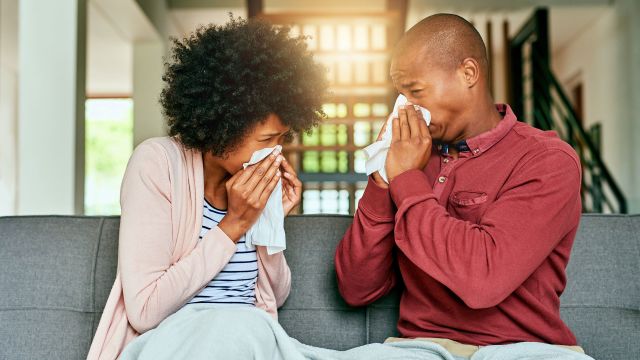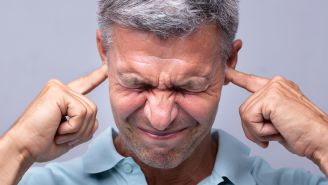Updated on March 1, 2021.
Your head is throbbing, especially around your eyes. You can’t stop coughing, and for some reason, your breath is terrible. Blowing your nose is a mess.
Bad news: You could have a sinus infection. Over 30 million American adults are diagnosed annually with sinusitis, most frequently triggered by the common cold.
So, what exactly are sinus infections? How can you tell if you have one? And—holy cow—how can you feel better as quickly as possible?
What is a sinus infection?
Your sinuses are hollow cavities found in the bones around your eyes and nose. When you have a sinus infection, the thin tissue that lines them—the mucous membrane—becomes inflamed. That inflammation leads to a buildup of mucus, which contributes to a stuffy nose and puts pressure on the surrounding areas. Thus, the characteristic sinus headache.
Sinusitis—an infection or inflammation of the sinuses—can be acute, subacute or chronic. Most common are acute infections, which last less than 4 weeks. Anything going over 12 weeks is defined as chronic sinusitis. Anything in between is typically called a subacute infection.
“Viruses are responsible for the great majority of acute sinusitis,” says Gustavo Ferrer, MD, Director of the Pulmonary and Critical Care fellowship at the Aventura Hospital and Medical Center in Aventura, Florida, and co-author of Cough Cures. That means that antibiotics won’t cure it; you simply have to manage your symptoms until the infection goes away by itself. “It will subside over time, roughly between one to two weeks,” he adds. “The good news is that some over-the-counter drugs can help relieve symptoms.”
About 1 or 2 percent of sinus infections are bacterial. Up to 80 percent of these resolve on their own in under two weeks, while the rest may be treated by antibiotics, depending on the advice of your healthcare provider (HCP).
Not every cold causes a sinus infection, and not every sinus infection is caused by a cold. Both acute and chronic sinusitis can also be triggered by allergies, fungus, medical conditions and nasal issues like polyps or a deviated septum.
How can you tell if you have an acute sinus infection?
It’s tempting to label every nasal issue as a sinus infection, but that’s not always the case. Common symptoms of acute sinusitis include:
- Headaches, and sometimes toothaches
- Pain or pressure, especially across your nose or around your eyes
- Congestion, often accompanied by thick yellow or green snot
- Coughing and/or a sore throat, frequently caused by postnasal drip
- Problems with smell or taste
- Feeling tired or weak
- Fever
- Halitosis (bad breath)
Many people believe that green snot means you have a bacterial sinus infection, curable only with antibiotics. Not true. Sage-colored mucus is common with viral infections and allergies and can happen when snot sits in your face for a while before being expelled.
There’s usually no need to see an HCP if your symptoms improve after a few days, says Dr. Ferrer. A trip to your HCP may be necessary if you have a bacterial infection, but it can often be difficult to distinguish between that and a viral infection. If your symptoms last longer than 10 days or improve before worsening again, call your HCP.
If you suddenly experience any of these symptoms, it’s a sign to seek medical attention immediately, even if they’ve been present for fewer than seven days:
- Abrupt vision changes
- Sudden and serious pain around your eyes or face
- Tenderness or swelling of the face
- Stiff neck
- Confusion
- Continual high fever
How can you tell if you have chronic sinusitis?
Does it feel like your sinus infection just won’t quit? If you experience at least two of the following for 12 weeks or more—even though you’ve been treated—it may be chronic sinusitis:
- A stuffed nose
- Discharge of mucus or postnasal drip
- Pain or pressure in your face
- Problems with smell
Chronic sinus infections can be triggered by colds but are typically caused by long-term inflammation. Sometimes, when treatments to control that inflammation fail, people with chronic sinusitis need surgery to drain their mucus.
What can you do for a sinus infection?
While you wait for your infection to run its course, you can take steps at home to feel better. Your goal, according to Ferrer: “Bringing that inflammation from the nose down and letting the mucus flow is probably one of the best things that patients can do.”
Look into nasal sprays: Store-bought saline nasal spray loosens up mucus, temporarily clearing it from your nasal passages. Ferrer suggests that saline with xylitol (Xlear), a natural OTC nasal spray, is superior to just saline. A steroid nasal spray like fluticasone (Flonase) may help tame inflammation, too, especially if you have underlying allergies. Unsure about using a steroid? Follow package directions and go to your HCP with questions.
Be wary of decongestant nasal sprays, like oxymetazoline (Afrin). Using them for longer than three days could cause rebound symptoms—persistent stuffiness eased only by the spray itself. Dryness and addiction are also possibilities.
Embrace sinus rinses—like the neti pot: Many sinus infection veterans swear by nasal irrigation systems, such as plastic squeeze bottles or teakettle-shaped neti pots. These devices are filled with a sterile saline solution and used to flush snot from your sinuses.
Neti pots and their ilk are widely available and typically safe, as long as you handle them properly. Don’t use water directly from your tap. Instead, use distilled water, a sterile saline solution or water that has been boiled and then cooled. Ferrer also suggests not using it for more than a week. Make sure the device is clean and dry for each application.
Try over-the-counter (OTC) meds: For sinus infections, experts recommend analgesics including acetaminophen (Tylenol), ibuprofen (Advil) and aspirin to ease pain, as well as decongestants like pseudoephedrine (Sudafed) to alleviate the pressure of congestion.
Many people find relief using mucolytics like guaifenesin (Mucinex), which thin and clear mucus. Others may opt for antihistamines (Benadryl), which dry out nasal passages. However, there’s not enough evidence that either work to treat acute sinusitis.
Speak with a medical professional about choosing the right OTC meds for a sinus infection. Certain decongestants and analgesics may be unsafe if you have another underlying condition; they can also interact with your medications. If your HCP gives you the green light to try an OTC drug, always use them as directed, and not for more than a few days. If you have old antibiotics lying around, don’t be tempted to take them; follow these directions for disposal.
Take care of yourself: Pressing a warm compress to your face may help ease sinus pain. To help keep your airways moist, take warm showers and make it a point to inhale the steam. A bedside humidifier that is adequate for the size of the room may also help, says Ferrer. You can also:
- Drink up. Dehydration encourages mucus production, so consume plenty of healthy liquids, as long as you don’t have any condition-related fluid restrictions. Water is always a good choice, and Ferrer recommends chicken noodle soup and hot tea with honey, ginger and lemon. Bonus: Warm beverages soothe sore throats, too.
- Get some rest. To promote drainage, prop up your pillow or sleep on your side instead of your back.
- Don’t imbibe. Alcohol contributes to dehydration and exacerbates sinus swelling.
Finally, you may want to avoid flying or scuba diving, since either can aggravate sinus pain. (For real!)
How can I avoid future sinus infections?
Once you’ve had a nasty sinus infection, you won’t want to relive the experience. To help prevent them from occurring again, get your annual flu shot and steer clear of people with colds or the flu.
What else can you do for a sinus infection? Use your humidifier. Live as healthfully as you can—get sufficient sleep, reduce stress and eat a wholesome diet with plenty of whole grains, lean proteins and fruits and vegetables. Avoid exposure to secondhand smoke and if you do smoke, take steps to quit. Last, but not least, always wash your hands.
Ultimately, sinusitis is a painful—and often revolting—nuisance. But approaching sinus infections with these smart strategies could save you a world of hurt.






